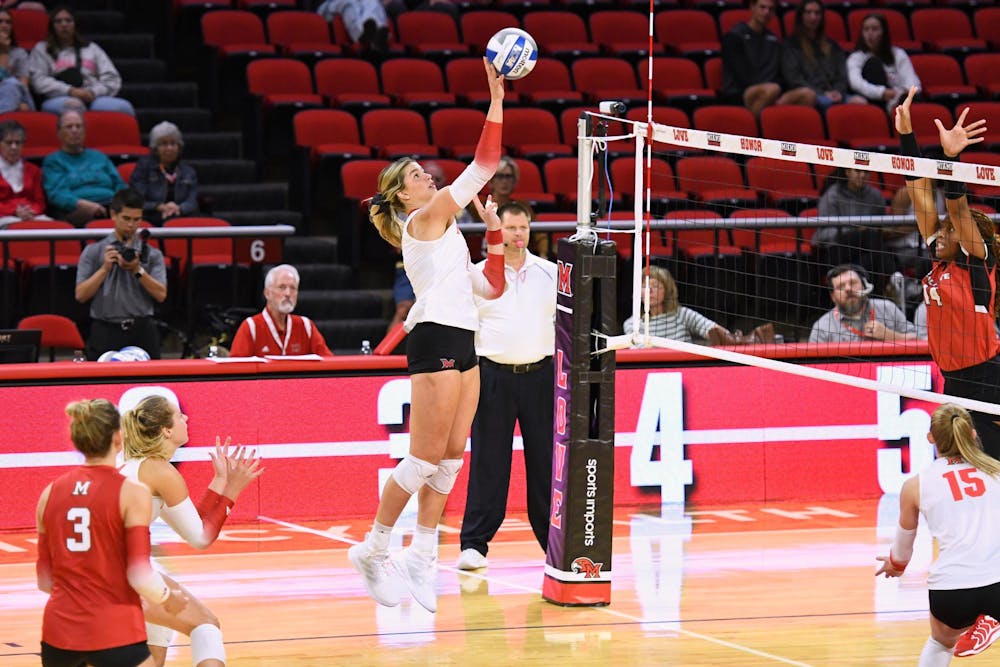Raegan Lantz is part of less than 1% of people in the United States living with Type 1 diabetes. Not only does she live with it, she perseveres and plays for the Miami University volleyball team as an outside hitter, not missing a single game last season.
Type 1 diabetes (T1D) is a chronic autoimmune disease that affects people of any age. People diagnosed with T1D live with it for the rest of their lives, but with careful management, can still lead healthy lives.
In T1D, insulin production is inhibited because the immune system attacks the pancreatic cells that produce insulin, the hormone that converts food into energy for your body.
Treatment involves monitoring fluctuating blood sugar (glucose). Many people with T1D manage their blood glucose levels with continuous glucose monitors from brands like Dexcom, whom Lantz has a partnership with.
Lantz is a part of Dexcom’s Name, Image and Likeness (NIL) program called Dexcom U, which aims to break stereotypes about T1D and empower athletes to achieve their goals in college sports. The program consists of 21 athletes from a range of universities competing across various sports.
She receives compensation from the agreement in product and has built a platform online to teach others about diabetes and how it impacts her as a person and an athlete. Lantz said having an opportunity to influence others has been especially meaningful for her.
“It's given me a platform to show kids, not only kids with Type 1, but anyone with any obstacle that they face, that it doesn't stop you from achieving your dreams,” Lantz said. “So don't let anybody tell you otherwise.”
Lantz still practices and plays in games at full capacity with the team whenever she can do so healthily. Her coach, Haley Davidson, said she only ever steps off the court to monitor her glucose and does so in a timely fashion, missing minimal practice and game time.
Since her diagnosis at 14, Lantz has learned over time the best ways to manage her diabetes on a day-to-day basis.
“Having Type 1 is a job: 24/7, no days off,” Lantz said. “I wear my Apple Watch when I play, just so it's easier to be able to check my numbers every so often, but if I start feeling bad, I always have some sort of quick gummy or Gatorade on the sidelines from the trainers.”
The volleyball team as a whole has grown to support Lantz as a teammate regardless of her diabetes and how it may or may not affect her.
Teammate and setter Kamryn Utley highlighted that for teammates with any kind of setback, focusing on their abilities instead of their disabilities is key.
Enjoy what you're reading?
Signup for our newsletter
“It's very important to meet them where they're at and to understand their boundaries and what they can do as a person,” Utley said. “They don't like for it to hold them back, so I think having that balance is super important.”
Lantz has educated her whole team about what her condition is and how she manages it, giving them all a lesson in perseverance and strength against the odds.
T1D is very commonly misunderstood, since diabetes is often connected to unhealthy eating habits or a sedentary lifestyle. Type 1 can occur in young people, and although the exact cause is not known, diet and exercise are not typically the cause.
Dexcom U sets out to bash these misconceptions, proving how strong T1D athletes really are. Lantz is an example of this ideal, continuing to play the sport she’s passionate about at a high, competitive level, all while managing her health at a more involved level than most.
“You can still accomplish all that you want to,” Lantz said. “Just because it didn't work out one day, you can still find that grace and that peace and continue to surround yourself with good people.”




